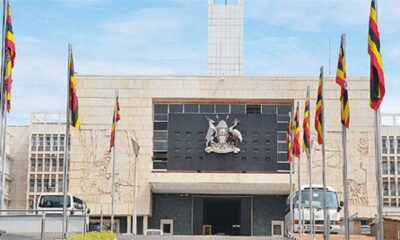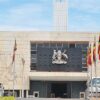News
WWF urges gov’t Ministries to join efforts to stop biodiversity decline

David Duli the WWF country Director in Uganda
The Wild World Fund for Nature (WWF) has called upon all government ministries to join and unite behind an ambitious mission, goals and targets that remove the sectoral drivers of biodiversity loss and decrease of the ecological foot print by 2030.
The WWF Country Director David Duli, in a statement called upon the government to join the coalition to create a global biodiversity framework that is a tool for transformative change.
“To achieve this, we need leadership at the highest level of state or government in both its development and implementation, through a whole-of-government approach,” Duli said.
According to a study by WWF Uganda under the BIODEV 2030 project, Uganda is one of Africa’s richest countries in biodiversity despite its relatively small size.
The study reveals that Uganda has diverse ecosystems consisting of forests, wetlands, rangelands, lakes and rivers with 53% of the world’s mountain gorillas, 11% of the global recorded species of birds, 7.8 % of global mammalian species, 19% of Africa’s amphibians and 14% of African reptilians.
However, there are a number of threats leading to loss of biodiversity including conversion of natural habitats to agricultural land, infrastructural development, proliferation of invasive species, human-wildlife conflict, illegal wildlife trade, climate change, pollution among others.
Duli, notes that with the drive to achieve the middle income status by 2020 (NPA, 2013 and NPA, 2015), there has been a tremendous drive in infrastructural development and therefore a need to address the negative impacts of infrastructure development on biodiversity particularly at ecosystem and species safety level.
He says WWF is implementing the BIODEV2030 project with an aim of establishing voluntary commitments to be shared and implemented by relevant stakeholders as a complement to the enforcement of the legal framework on stop biodiversity decline by 2030 and to restore biodiversity by 2050. This is done through multi-stakeholder dialogue and science-based assessment.
Meanwhile, Francis Ogwal, the Head of Biodiversity at National Environmental Management Authority (NEMA), says Uganda is witnessing unprecedented degradation of the environment which is leading to loss of biodiversity.
The Status of biodiversity according to the latest National State of Environment Report 2018-2019 Forests, Forest cover in Uganda declined, from 23.8 percent (4.8 million ha) in 1990 to about 9.9 percent (2 million ha). Natural forests have experienced a decline in the past decades while plantation forests increased from 3 percent to 8 percent between 2010 and 2017.
“Out of the 31,411.4 km2 of wetlands left country wide, 21,526.3 km2 (69 percent) were intact while 9,885.1 km2 (31 percent) were degraded, In rural areas, wetlands are mainly degraded through subsistence and commercial agriculture as a result of poor land tenure system which leaves land fragmented,” the report reads.
The report states that in protected areas, there has been an increase in wildlife populations. For instance the number of Mountain Gorilla increased from 292 in 1995 to over 400 in 2017, the Elephant increased from about 2000 in 1996 to 5,808 in 2017, and Buffaloes increased from 18,000 to 37,054, Giraffe population increased from 250 individuals in 1995 to 880 in 2017while the Chimpanzee population increased from 3,300 in 1997 to 4,950 in 2003.
Uganda ratified the Convention on Biological Diversity (CBD) on 8th September 1993. The Convention entered into force on 29th December 1993. To-date 196 countries are Parties to the CBD making the CBD of the Conventions with the biggest number of Parties.
In December 2000, the UN General Assembly adopted 22 May as the International Day for Biodiversity (IDB) to commemorate the day, IDB is meant to increase awareness and understanding on the importance/values of biodiversity for human wellbeing.
According to Ogwal, The choice of this year’s national theme “Restoring nature together” for IDB 2021 is meant to mobilize all Ugandans to take and sustain concrete action to restore the environment especially focusing on forests, wetlands and species of wild plants (flora) and wild animals (fauna).
“The UN has declared 2021 -2030 the Decade for Ecosystem Restoration thus, the national theme is timely to put Uganda on course to begin a serious and sustained programme of restoration of ecosystems in Uganda,” he says.
Comments























